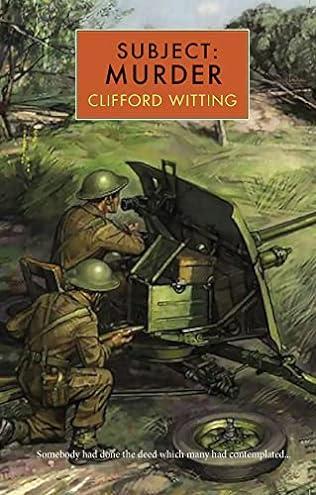A review of Subject: Murder by Clifford Witting – 240123
One of the three Clifford Witting novels reissued by Galileo Publishers in 2023, Subject: Murder, originally published in 1945, the sixth in his Inspector Harry Charlton series, has a very autobiographical feel about it. It charts the early military career of Peter Bradfield, one of Charlton’s junior colleagues, and is based on Witting’s “personal experience as a bombardier in an anti-aircraft detachment”. It is full of the minutiae of army life told with a dark acerbic humour and so convincing is it that the reader finds themselves immersed in the daily grind of the lives of the protagonists.
In fact, you could argue that the murder mystery, because of course there is one, plays second fiddle to the author’s desire to put his military experience down on record. In comparison to the long sections about life in the detachment, the murder and the resolution of how and whodunit is wrapped up with unseemly haste and, although the choice of murderer makes sense with little clues thrown in along the way, it seemed a little random with a couple of others just as likely. There is almost time and focus spent on Bradfield’s burgeoning and successful romantic liaison.
As luck would have it, as it often does in Golden Age detective fiction, Bradfield ends up posted to the Lulverton area, where he served as a detective in civvy street and, more importantly for the series, the stomping ground of Harry Charlton who gets dragged in to investigate the murder of Battery Sergeant-Major George “Cruel” Yule. There is no secret that the sadistic and vindictive Yule who subscribes to the dictum that knowledge is power is going to meet his just desserts, as it is indicated almost at the start of the book.
It is a cruel murder, inspired by a passage detailing the torture and death of the Marquis of Santagena from The Bloodhound of Valladolid, a biography of Torquemada, with Yule, bound with a dog lead and tied to a horse with a gun rope, being dragged and trampled by it after it had been incited by a thistle inserted into its posterior. The animus against Yule is steadily built up as the story unfolds; he is lazy, is conducting an abusive relationship with a woman in the village, he claims that Johnny Fieldhouse assaulted him and has him sent to a detention centre where he breaks his jaw, he knocks a cat into a boiling bucket of tea and there is the mystery of what happened to Fitzgerald’s dog which was handed over to Yule but was later found with such severe injuries that it had to be shot.
Circumstantial evidence points to Johnny Fieldhouse as the murderer, but as his close friend Bradfield cannot believe that he is guilty. Charlton, though he is forced to arrest Fieldhouse, also seems to share his colleague’s doubts. Some off stage investigations by Sergeant Martin reveal that there is a different construct to the motivation behind the murder and one of the officer’s alibis is quickly broken. The book ends with Charlton getting his man and Bradfield getting his girl.
The resolution of the case revolves around access to and missing keys, alibis, rubber gloves, and whether a phobia of horses can easily be eradicated. There are clues as to the identity of the murderer throughout the book but the reader has to be unusually attentive to spot them and realise their import.
Wartime experiences has inspired great literature and whilst Witting’s has not contributed to a classic, it is an entertaining enough read. I did wonder at times where the book was going, a feeling compounded by its somewhat rushed conclusion.
This post first appeared on Windowthroughtime | A Wry View Of Life For The World-weary, please read the originial post: here

